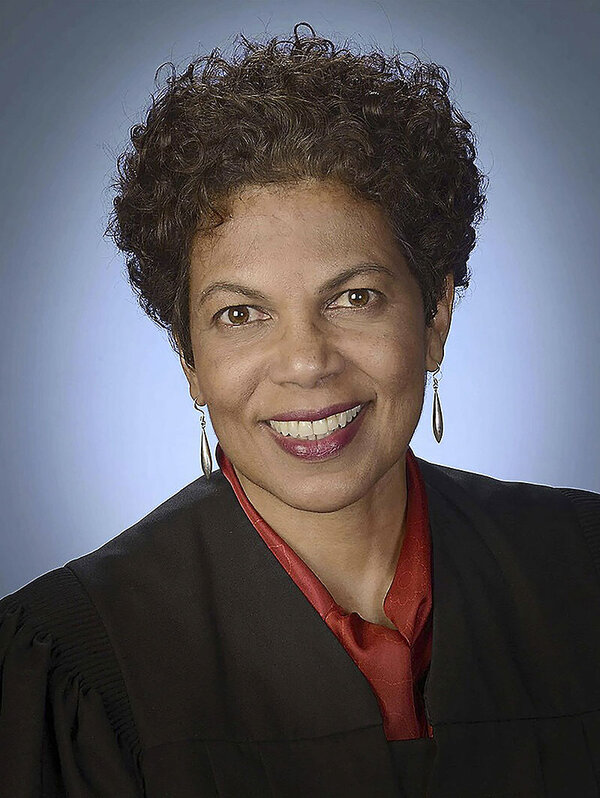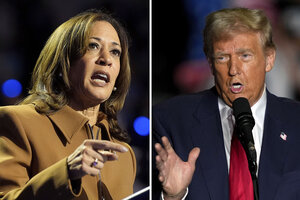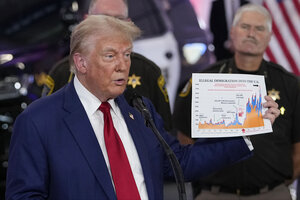Special treatment? How judges are handling Trump ahead of election.
This was supposed to be the week.
Former President Donald Trump’s legal travails were about to reach their first dramatic conclusion. Fifty days out from a presidential election in which he is again the Republican nominee, Mr. Trump would be sentenced in a Manhattan courtroom.
Prosecuting a former leader is perhaps the ultimate stress test of a democracy’s justice system. So what would the punishment be? Prison time? A slap on the wrist?
Why We Wrote This
A story focused onThe U.S. justice system is meant to treat every defendant equally. But when that defendant is both a former president and a presidential candidate, courts are showing the flexibility that accompanies foundational principles.
The answer, as has become the norm in Mr. Trump’s cases, is that America will have to wait. The sentencing is now scheduled for late November, after a decision last week by New York state Judge Juan Merchan. The ruling is symptomatic of the pressures judges are weighing in all four criminal cases against the former and possibly future president.
The cases have tasked courts with an unprecedented challenge: how to accommodate this unique defendant’s unique circumstances while upholding the bedrock expectation that every defendant is treated equally under the law. But they’ve also revealed that the justice system’s foundational principles have some pliability.
All this matters because of ongoing concerns that Mr. Trump is being – or will be – treated either too harshly or too lightly, and what that could mean for democratic norms and the rule of law.
The judges presiding over the Trump cases have made differing use of that pliability. With little precedent for judges to look to, Mr. Trump has received what some experts view as undue special treatment. Other judges have taken a harder line. The U.S. Supreme Court set a new challenge in July – and further delayed some of the cases going to trial – when it ruled that former presidents are entitled to broad immunity from criminal prosecution related to their presidential acts.
“No other former president of the United States has ever been criminally prosecuted, so he’s unique in that way. But every criminal defendant is unique in some ways,” says David Alan Sklansky, a professor at Stanford Law School.
The real question, he adds, is whether the unique features of the cases “are being taken into account consistent with the idea that the law applies equally to everyone.”
Sentencing delays are not unusual
Mr. Trump is facing four criminal prosecutions. Two of the cases – a federal prosecution in Washington and a state prosecution in Fulton County, Georgia – concern his efforts to overturn the 2020 election. One federal case in Florida involves his allegedly unlawful retention of classified government documents, and the state case in Manhattan concerns charges of falsifying business records to conceal hush money payments during the 2016 presidential campaign.
In his order last week, Judge Merchan explained why Mr. Trump, convicted in May in the hush money case, won’t be sentenced until just before Thanksgiving.
It’s not unusual for sentencings to be delayed due to a defendant’s circumstances, and “given the unique facts and circumstances of this case, there is no reason why this Defendant should be treated any differently than any other,” he wrote.
The order, he added, “should dispel any suggestion” that the court is favoring “any political party [or] any candidate.”
Days earlier, in a case in which Mr. Trump is facing federal charges related to his attempts to overturn his 2020 election defeat, U.S. District Judge Tanya Chutkan had taken a different tack. During a procedural hearing in Washington, lawyers for Mr. Trump proposed pausing proceedings until after the election.
“We’re being put in an incredibly unfair position,” one of Mr. Trump’s lawyers said, according to reports. “We’re talking about the presidency of the United States.”
“I’m not talking about the presidency of the United States,” replied Judge Chutkan. “I’m talking about a four-count indictment.”
Different cases may require different handling
While the two judges appear to be handling their respective Trump cases differently, eliciting complaints of bias across the ideological spectrum, they are doing so because the situations are not comparable, some experts say.
“There’s a really significant difference between the posture of the two cases,” says Mary McCord, a visiting professor at the Georgetown University Law Center.
In one, a judge is being asked to sentence a major-party presidential candidate months before an election. With a possible sentence ranging from a fine and probation to four years in prison, any outcome could be seen as affecting votes for or against Mr. Trump.
In the other, a judge is being asked to schedule briefings on a range of pretrial questions, including the extent to which presidential immunity shrinks the government’s case. The parties are essentially arguing about how to schedule those debates. It’s reasonable to assume voters won’t be affected by such disputes.
Judge Merchan’s decision in Manhattan also has precedent. A federal judge in Texas, for example, rescheduled a corruption trial of Texas Democratic Rep. Henry Cuellar for March 31, 2025.
But Judge Chutkan’s decision, while lower-profile, is also significant. If she paused proceedings in the District of Columbia because of the “sensitive” timing of the election, says Professor Sklansky, she would create a precedent that “you get a special exemption from being held criminally accountable as long as you’re running for president.”
Is a former U.S. president a unique defendant?
Meanwhile, in another federal prosecution of Mr. Trump, Florida-based U.S. District Judge Aileen Cannon – a Trump appointee – has taken a more lenient view of this unique defendant.
Randomly assigned to the case, Judge Cannon dismissed the charges concerning Mr. Trump’s allegedly illegal handling of government documents in July after ruling that Jack Smith, the special prosecutor hired to lead the case, had been appointed unlawfully.
Judge Cannon regularly sided with the former president during two years of pretrial arguments, and she has at times suggested that Mr. Trump merits special treatment.
A prosecution of a former president carries “stigma ... in a league of its own,” she wrote in a 2022 order in the case, inflicting “reputational harm of a decidedly different order of magnitude.”
A panel of the U.S. Court of Appeals for the 11th Circuit disagreed. Creating a “special exception” for a former president, the panel wrote in a decision overturning Judge Cannon’s order, “would defy our Nation’s foundational principle that our law applies ‘to all, without regard to numbers, wealth, or rank.’”
In a recent amicus brief in the case, an ethics watchdog and a retired federal judge argue that “a reasonable observer could conclude that [Judge Cannon] has acted in accordance with a conviction that prosecuting a former president ... is an intolerable affront to his dignity.”
For this reason, among others, they believe the 11th Circuit should assign the case to a new judge. Mr. Smith, who is asking the appeals court to revive the case, is not making that argument. Whether she keeps the case or not – assuming the case is revived at all – some experts believe she has been giving Mr. Trump favorable treatment compared with other judges.
“The argument Judge Cannon made was you should get special dispensation not necessarily because you’re running for president but because you’re a former president,” says Professor Sklansky. “I think giving special dispensation either to presidential candidates or to former presidents is inconsistent with the idea that nobody is above the law.”
Pace of criminal cases should be fair to both parties
The situation in Florida is unlikely to be resolved before the election, however. So as Mr. Trump makes his final appeals to voters in the coming months, he will do so free of any impending legal peril.
In what is expected to be a tight presidential race, spending valuable time on the campaign trail instead of in a courtroom is one benefit for him, as is having less media and public attention on potentially damaging legal proceedings. But this is an example of the justice system working as intended as well. Criminal cases are supposed to proceed at a pace that is fair to both parties, not at a pace that’s convenient for political campaigns.
“Trump has been exceedingly successful in all of these cases in using his legal strategy to delay getting to justice,” says Professor McCord.
“He has that right as a defendant,” she adds. “A team of lawyers filing brief after brief ... can really gum up the works,” she continues. But, “A lot of defendants don’t have [his] resources.”


















